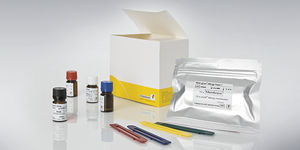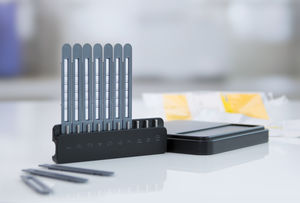
- Laboratory
- Laboratory medicine
- Solution reagent
- R-Biopharm AG
Solution reagent kit RIDA®clinicalfor allergy analysislyophilized
Add to favorites
Compare this product
Characteristics
- Type
- solution
- Applications
- clinical, for allergy analysis
- Format
- lyophilized
- Tested parameter
- IgE, IgG
Description
The RIDA® CCD-Inhibitor is an accessory for use in in vitro diagnostics for the inhibition of anti-CCD IgE in human serum and plasma.
General information:
CCDs (cross-reactive carbohydrate determinants) are carbohydrate side chains inducing the production of specific IgE antibodies. A Type I allergy is caused by the formation of specific IgE antibodies against allergens. Most allergens are proteins. In eucaryotic organisms, many proteins are subjected to post-translational glycosylation and therefore carry carbohydrate side chains. Specific IgE antibodies are produced by the immune system against the real allergens but also against carbohydrate side chains of allergens (anti-CCD IgE) of plant origin, of insects, of molluscs and of latex. The anti-CCD IgE also leads to cross-reactions with unrelated proteins and therefore are called “cross-reactive carbohydrate determinants (CCD)”.
CCDs do not cause allergic symptoms
Approximately 25 % of allergic patients produce anti-CCD IgEs, which, however, do not trigger allergic symptoms and therefore most likely have no clinical relevance. This low clinical significance was thought to be due to low binding affinity of anti-CCD IgE and/or poor biologic activity of these antibodies. Low binding affinity could be excluded by experiments from Jin et al.1 where binding affinities of anti-CCD IgE and IgG were determined and turned out to be quite high.
Catalogs
Related Searches
- Assay kit
- Solution reagent kit
- Blood assay kit
- Serum assay kit
- Immunoassay assay kit
- Plasma assay kit
- Infectious disease detection kit
- Diagnostic reagent kit
- Rapid lateral flow test
- Immunoassay rapid diagnostic test
- Molecular test kit
- Respiratory infection test kit
- Clinical assay kit
- Infectious disease rapid diagnostic test
- Cassette assay kit
- Lateral flow test kit
- COVID-19 detection kit
- ELISA assay kit
- Real-time PCR test kit
- Quality control reagent kit
*Prices are pre-tax. They exclude delivery charges and customs duties and do not include additional charges for installation or activation options. Prices are indicative only and may vary by country, with changes to the cost of raw materials and exchange rates.





